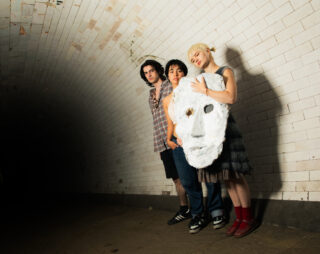Mary In The Junkyard: “It’s very chaotic, but it kind of works”
Introducing your favourite new “angry weepy chaos rok trio”

Introducing your favourite new “angry weepy chaos rok trio”
Clari Freeman Taylor is tired. It’s at least 25 degrees in London, we’re in the tourist hotspot that is Cutty Sark during peak school trip time and she’s running on very little sleep – but for good reason. “I was trying to finish this dress,” she says, gesturing downwards to show off her teal crochet garment. “And finish a song.” The lead vocalist and guitarist of burgeoning London trio Mary In The Junkyard, her tiredness can also be attributed to a fairly busy, but exhilarating, festival season – their first ever. “It’s been really good,” she says. “It really surprised me, I didn’t think we’d be playing festivals this year.”
The self-described “angry weepy chaos rok trio”, which also includes drummer David Addison and bassist Saya Barbaglia, formed just over a year ago, finding themselves drawn together almost by accident. “Saya and I met through playing string quartets together and David and I were in a band together,” she says of their formation. “Then I started writing songs when I was a bit older just to kind of make sense of things. I guess I was really inspired by songwriters and ‘crazy’ women.” Finding herself drawn to soloists rather than bands, Clari points to her desire to take up space as a catalyst for pushing ahead with Mary. “I always wanted to fill up space with the sound I made. It’s hard to do that on your own.”

While they’re yet to release music, their DIY punk riffs, accented by Joni Mitchell-inspired poeticism and Björk’s whimsy, see them regularly draw in crowds at much-loved South London venue The Windmill – a second home to them. “I like that other people see us and associate us with it because it’s such a wonderful place,” she says. “It’s very authentic. Tim [Perry – head booker and promoter] doesn’t care about profit, he just cares about putting really great music on and he’s been really nurturing. We owe him a lot.” A fertile community that has fostered a new generation of guitar bands, the DIY label is one that Mary as a group wear proudly. “I think we’re quite unprofessional,” says Clari. “I don’t really feel like a guitarist, I play with my hand rather than a pick.” Preferring to give way to happy accidents rather than a deeply methodical approach, there is a beautiful rawness not only to their sound but also the writing. “We don’t try to be anything. We just do what feels good.”
And what feels good to them is just about everything. That’s the beauty of Mary. “Everything we do feels very chaotic. I think we all have a lot of energy to give to it,” Clari chuckles. “It’s pretty sporadic, but it kind of works. Sometimes it feels just like everything is falling into place.”
Clari and Saya both having classical backgrounds, and while symphonic parallels aren’t what first come to mind when you think of angsty rock bands, the expansiveness of the classical genre is apparent in their creative approach, with Saya sometimes adding viola parts to their performances. “It’s a really cool layer,” Clari says. “We’re a trio but we’re trying to figure out how much we can do with that. It’s probably good for us creatively to have to figure out how to do things just with us.”
They are sometimes accompanied by Brian, too – a large paper mache head, who is also lurking around during our interview today. He’s yet to earn his stripes as an officially christened fourth member of a band, but his presence is indicative of the playfulness that underpins Mary as a collective. “I just think he’s funny,” Clari laughs. “We want to have a bare bones kind of vibe, like paper mache. But the main reason he’s here today is because he was in Saya’s room for a while. She wants me to take him home!”
It’s unclear if Brian will remain a constant, but one thing Clari is sure of is that Mary In The Junkyard are set to release music soon; yet part of her is reluctant. “It’s nice to not have music out, it makes us kind of mysterious and cool,” she laughs. “I’ll be sad to lose that.” Pointing to the loyal fanbase that has already been built, the mild trepidation is understandable. “Because people can’t listen to our music really easily, they have to work a bit harder. They’ve got to seek us out.”